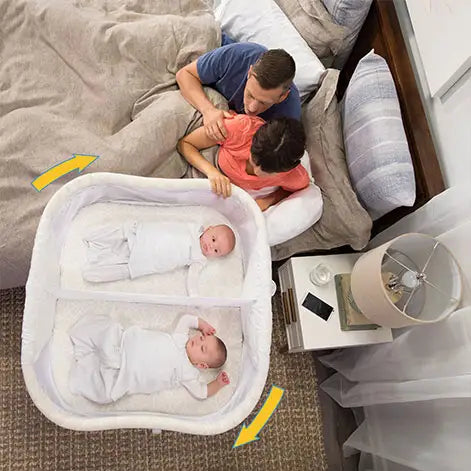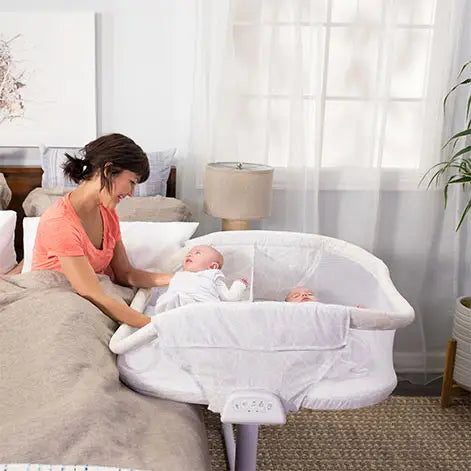MANAGING SLEEP WITH NEWBORN TWINS

Whether you’re expecting twins, or you recently brought them home from the hospital, many parents have one big question on their minds – How will I ever get some sleep?
As a mum of twins and a Certified Sleep Consultant, I often get asked, “How soon can I start sleep training twins?” Parents should know that formal sleep training is discouraged until at least 4 months of age (and always with the approval of your pediatrician first). Never fear! There are many things to do to make nighttime more manageable. Starting in the first few months of life, you can begin to lay the foundation for a lifetime of healthy sleep habits.

Keep Babies Close
Newborns need our constant attention, particularly if you’re dealing with two babies at the same time! The American Academy of Pediatrics (AAP) recommends babies sleep in the same room as a caregiver, on their own sleep surface, for at least the first 6 months of life (ideally, for babies first year of life). Having the twins in your room will make tending to them through the night much easier.
The AAP clearly states that each baby should sleep on his or her own sleep surface, and not in the bed with an adult. Before you’re ready to put the babies in their own cots in the nursery, use two portable cots or a double bassinet for twins.
The HALO® BassiNest for twins is designed to sit right next to your bed for convenient access to both of your babies with its ingenious 360° rotation. And, unlike other bassinets for twins, it features a mesh divider in the center, allowing your babies to see, smell and soothe each other, while still sleeping safely in their own separate sleep space. It’s an ideal option for families of multiples to make night times easier. Do not put your twins together in a HALO bassinet made for one baby. There is not enough room for them to sleep safely.
Implement a Schedule
When managing life with twins, schedule is key! Our newborns will need to eat around the clock, so for the first few months your schedule should be based on feeding times, as directed by your babies’ doctor. Weight gain is one of our main concerns at first, so you’ll need to wake your babies to feed them until their doctor has determined that they can go longer between feedings at night.
Juggling two babies all night can be hard work! To ensure you get a little rest, you’ll want to feed both babies at the same time and then put them back to sleep. If one wakes and the other is asleep, wake the sleeping baby when it’s time to eat. Otherwise, you’ll need to be feeding at least one baby all night long!
Nighttime with twins is an all-hands-on-deck situation! Whenever possible, I encourage both parents to be present for feedings, and then you can take turns sleeping in another room between feedings. Some parents take a “one night on, one night off” approach so each parent has the opportunity for a full night’s sleep. Other parents divide and conquer, one tending to baby A and the other baby B for the whole night. Whichever method you chose, teamwork is key!

Set Reasonable Expectations
As a parent of twins, I’ve learned to expect the unexpected! Just when you think you have these little ones figured out, they go ahead and change the game! A baby’s development is constant; sometimes it seems their abilities advance on a daily basis.
Managing our expectations around our babies’ sleep can be particularly important. Just like their other skills, sleep develops rapidly in the first few months of life. While sleep training twins isn’t a possibility in the early months, knowing benchmarks for sleep development can help set parents up for success.
It’s important for parents to know that during the first 2 months (adjust the age if your babies were born before 38 weeks) we can’t have very high expectations for the length of time our children will sleep. But luckily no bad habits can be made yet. As long as your babies are sleeping in a safe sleep space (a twin bassinet is a great option), do whatever you have to do to get some rest.
If you find you’re always rocking them or bouncing them to sleep, that’s ok. Many babies are calm when swaddled, so use a swaddle blanket liberally! The HALO® SleepSack® Swaddle is a great fuss-free swaddle – with its adjustable fasteners and reverse zipper, it makes swaddling in the dark and nappy changes easy. Some babies will sleep better with a pat from a caregiver’s hand – touch is so important at this age. Launching soon in Europe, the HALO® BassiNest twin sleeper can again be an amazing solution for this. Thanks to its retractable sides and 360° rotation, mum or dad can easily lay in bed, reach over and tend to a fussy baby.
Once your babies begin social smiling and laughing, their sleep starts to develop, too. This generally happens around 2 months of age. At this point, our kids are starting to understand cause and effect, so beware of habits that may be beginning to form.
Mum tends to baby in HALO BassiNest Twin from bed
While we can’t yet implement formal sleep training for twins, we can encourage healthy sleep hygiene and self-soothing. As babies become more socially engaged, it can become more difficult for them to fall asleep in a busy environment; they can more easily become over stimulated and thus, overtired. Keep an eye on the clock and put the babies in a dark, quiet room after an hour of wake time. An hour and a half is the maximum amount of time our babies should be awake. This may sound like a very short period of time, but preventing the twins from being overtired during the day will help them sleep more soundly at night.
Two months is also the age that we can expect nighttime sleep to lengthen. Hooray! Usually the earlier half of the night consolidates first, so it’s likely your babies will sleep for 5-6 hours in the first half of the night, and then be awake more in the second half. This is normal and will lengthen very soon!
While I can’t promise a full night’s sleep while caring for your newborn twins, keeping them close, feeding on a schedule and having reasonable expectations will all help your family get the rest you need!
About the Author:
Lauren Lappen – MA. Sleep Associate at Twin Love Concierge, Lauren is the proud mother of an older daughter Ellie and fraternal twin girls Kira and Rebecca. Lauren is a graduate from Washington University in St. Louis with a B.A. in Psychology and Educational Studies, and has an MBA from Babson College. She is also a Certified Pediatric Sleep Consultant by the Family Sleep Institute and an ICF certified Coach through Fielding Graduate University. Lauren always had a desire to use her coaching to help parents of young children and channels her passion for sleep by transforming the lives of parents struggling to get the well deserved rest they need. You can reach Lauren at lauren@twinloveconcierge.com for more information on the Twin Love Concierge online Twins & Sleep class or private sleep consulting.

